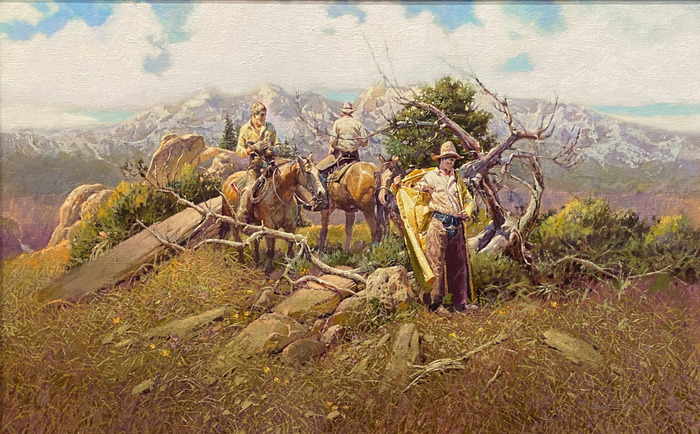Don Prechtel "Tarahumara"
-
- Don Prechtel
- (Born 1936)
- Oregon / California Artist
- Image Size: 10 x 14
- Frame Size: 18.25 x 22.25
- Medium: Oil
- "Tarahumara"
- Contact for Price & Info
- View All By This Artist
Details
Tarahumara, self-name Rarámuri, Middle American Indians of Barranca de Cobre (“Copper Canyon”), southwestern Chihuahua state, in northern Mexico. Their language, which belongs to the Sonoran division of the Uto-Aztecan family, is most closely related to those of the Yaqui and Mayo. Culturally the Tarahumara show similarities to such neighboring Uto-Aztecan peoples as the Tepehuan, Huichol and Cora, and Pima-Papago. They numbered about 70,000 at the turn of the 21st century. The land inhabited by the Tarahumara is high, broken plateau, cut by deep gorges and canyons; the climate is reasonably cool, but conditions are not particularly suited for agriculture. The Tarahumara—who were forced from more-hospitable lands by Spanish settlers—are nonetheless small-scale farmers, growing corn (maize), beans, squash, and potatoes and tending orchards. They also keep goats and cattle. Crops are grown in small pockets of suitable soil, and a household’s crops may be separated from one another by several miles. Settlements are scattered, usually loose clusters of households called ranchos. Each home consists of a one-room log or stone house and several storage huts. Settlements are not particularly stable, and a certain amount of seasonal mobility is usual. Pottery, blanket weaving, and basketry are the chief crafts practiced. The Tarahumara are legendary for their ability to run great distances without tiring, though their name for themselves seems to mean “those who walk well.”
Nominally Roman Catholic, the Tarahumara celebrate fiestas for local patron saints; in the ranchos, however, pre-Christian rituals are usual, and native fiestas are held. Their mythology blends pagan and Christian elements. -
-
Biography
Don Prechtel (Born 1936)
The following, submitted April 2005, is from the artist.
Don Prechtel is a professional working artist since 1968.
He has paintings in the collections of: Virginia Military Institute; Military Intelligence Museum, Ft. Huachuca, AZ;. Hamilton Collection, Museum of Native American Cultures, Western Art Association, Notre Dame Alumni Association building, Government House, Dublin, Ireland; Holt-Atherton Special Collections, University of the Pacific, Stockton, Ca;, University of Oregon Museum of Natural and Cultural History.
Awards:
John Scott People's Choice Award, Jurors Award, Purchase award, Merit Award, Heritage Award in 2001 and 2004
Founders Award National Arts for the Parks, 2003.
Professional Organization:
Founding member of the Northwest Rendezvous Group





